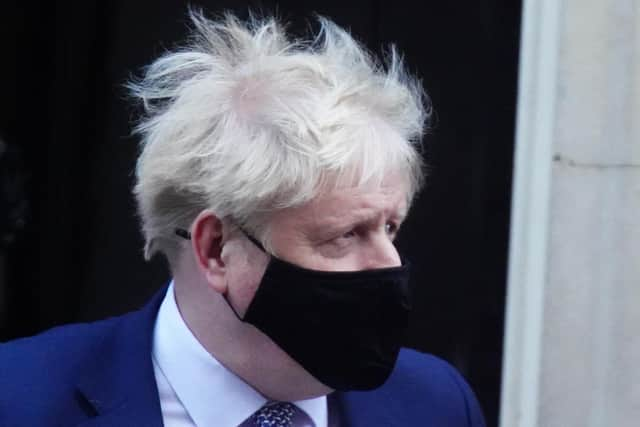Boris Johnson faces pressure from within his own ranks over Downing Street drinks admission
Mr Johnson apologised in the House of Commons yesterday for attending the “bring your own booze” party in the back garden of Number 10, which he insisted he believed to be a “work event”.
Conservatives in Yorkshire were among those who voiced their frustrations, with one MP stating that Mr Johnson’s explanation “will not wash” with the public, and the Tory party’s leader in Scotland calling for the Prime Minister to quit.
Advertisement
Hide AdAdvertisement
Hide AdIn the Commons yesterday, Mr Johnson said that he attended the gathering for about 25 minutes on May 20, 2020, to “thank groups of staff” but “with hindsight I should have sent everyone back inside”.


He acknowledged public anger, saying: “I know the rage they feel with me and with the Government I lead when they think in Downing Street itself the rules are not being properly followed by the people who make the rules. I believed implicitly that this was a work event.”
An inquiry into the party and other alleged lockdown-breaching events in Downing Street is being carried out by senior civil servant Sue Gray.
The Tories’ Scottish leader, Douglas Ross, said: “I don’t think he can continue as leader of the Conservatives”. Other MSPs also called for his resignation.
Advertisement
Hide AdAdvertisement
Hide AdTory MP William Wragg, chairman of the Public Affairs and Constitutional Affairs Committee, said: “The Prime Minister’s position is untenable.”
Julian Sturdy, the Conservative MP for York Outer, told The Yorkshire Post that “Downing Street should not have been holding social events of any sort” and that he “shares the frustration and disappointment of the many constituents”.
He said: “Whilst the investigation will decide if any rules were broken, it is already clear that the Prime Minister’s assertion that this was a work-related event will not wash with the British public, who at the relevant time were making significant sacrifices. The fact is, that at a time when people were not allowed to attend the funeral of their loved ones or comfort their dying relatives, when fines were being issued for people meeting for a coffee in the park, Downing Street should not have been holding social events of any sort.”
The Conservative MP for Thirsk and Malton, Kevin Hollinrake, said that people should wait for the report from Sue Gray. In a note to constituents, he said: “There is a requirement within the ministerial code that any significant breach would necessitate the tendering of a resignation and this of course would also apply to the Prime Minister.”
Advertisement
Hide AdAdvertisement
Hide AdLabour leader Sir Keir Starmer called on the Prime Minister to resign, as did the SNP’s Westminster leader Ian Blackford and Liberal Democrat leader Sir Ed Davey.
Chancellor and Richmond MP Rishi Sunak, who was in Devon yesterday, said: “The PM was right to apologise and I support his request for patience while Sue Gray carries out her inquiry.”
Deputy Prime Minister Dominic Raab said Mr Johnson would be in post “for many years to come”.
Meanwhile, deaths from Covid-19 are beginning to climb once more. Yesterday, another 398 deaths were added to the national tally, alongside another 129,587 cases.
Advertisement
Hide AdAdvertisement
Hide AdAnd some of the highest Covid infection rates in England can be found in Yorkshire and the Humber. The Office for National Statistics showed that in the week to January 6, about one in 10 people in the region were likely to test positive for Covid-19. The figures were similar in the North-West of England.
However, in London, where the new variant first peaked before Christmas, infection rates dropped to about one in 15, down from one in 10 a week earlier.
An estimated 4.3m people in private households across the UK had Covid-19 in the seven days up until January 6.